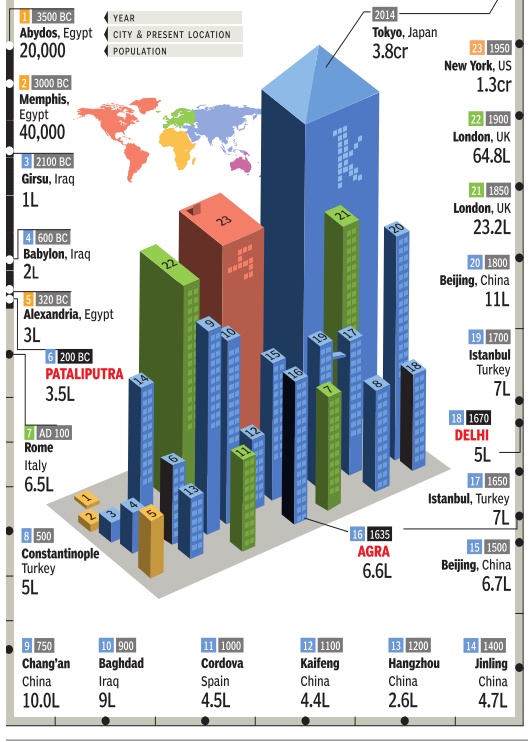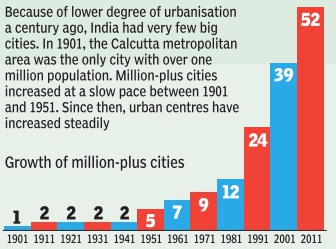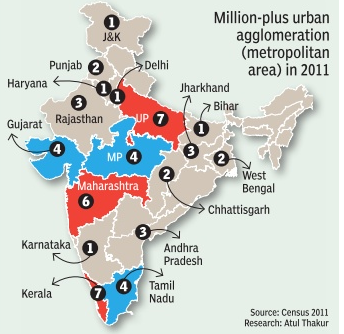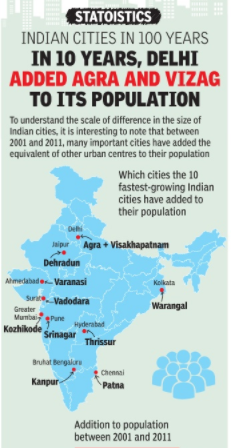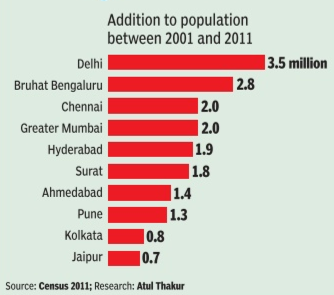Cities of India: growth
(→Cities with a population of 10 lakh) |
|||
| Line 3: | Line 3: | ||
[[Category: Economy-Industry-Resources|C]] | [[Category: Economy-Industry-Resources|C]] | ||
[[Category: Places |C]] | [[Category: Places |C]] | ||
| + | |||
=Growth of cities= | =Growth of cities= | ||
==History: I== | ==History: I== | ||
| Line 85: | Line 86: | ||
[[ Cities of India: the best and the worst ]] | [[ Cities of India: the best and the worst ]] | ||
| − | [[ | + | [[ Cleanliness ranks of Indian cities, districts: 2014-15 ]] |
| + | |||
| + | [[ Cleanliness ranks of Indian cities, districts: 2016 ]] | ||
| + | |||
| + | [[ Cleanliness ranks of Indian cities, districts: 2017]] | ||
| + | |||
| + | [[ Cleanliness ranks of Indian cities, districts: 2018]] | ||
[[ Cities of India: issues ]] | [[ Cities of India: issues ]] | ||
Revision as of 11:09, 12 September 2018
Contents |
Growth of cities
History: I
SIZE IN THE CITY The Times of India Dec 04 2014
Research: Dake Kang
I n 1974, Tertius Chandler came out with his groundbreaking book, “3000 years of urban growth“, which estimated the sizes of urban areas throughout history for the first time. It is now regarded as a classic. The earliest large cities were in today's Iraq and Egypt, reflecting the ancient Egyptian and Mesopotamian civilizations. Then came Pataliputra, with the rise of the Maurya Empire. Around 1 AD, the Roman empire came to the forefront, followed by the Byzantines. In the early Middle Ages, the Muslim empires became prominent with Baghdad and Cordoba, followed by China, which held the title for half a millennia. India got back to the forefront with the Mughal empire's capitals Agra and Delhi.
By the mid 19th century, industrialization started counting, with London and New York as the largest cities. Finally, in the modern era, Tokyo became the world's largest city, a title it holds to this day.
History: II
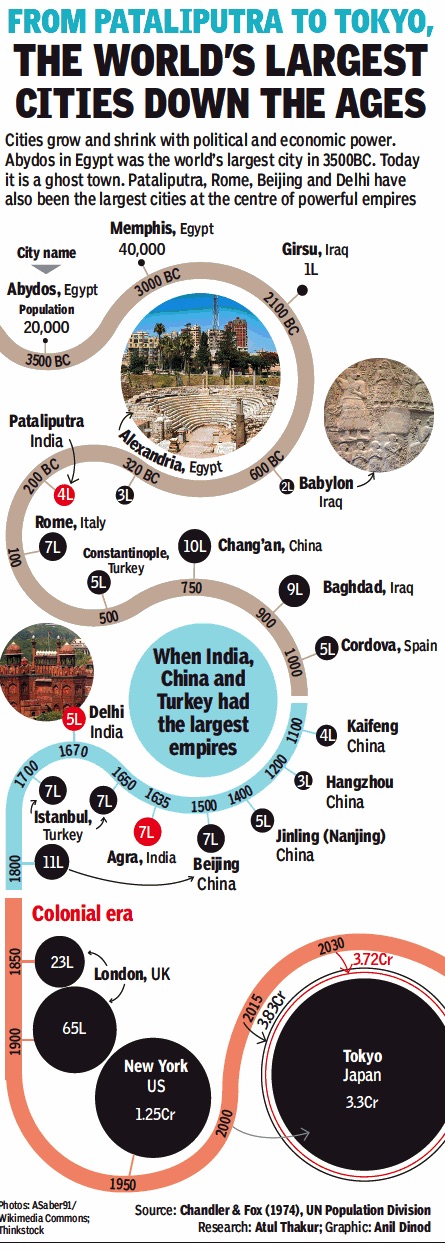
From: May 14, 2018: The Times of India
See graphic:
3,500 BC to A.D. 2018: the growth of large cities in India, China and the world
India’s 6 fastest growing cities, 2016 – (projection:) 2021
Delhi India's largest, Asia's fastest growing city, August 10, 2017: The Times of India
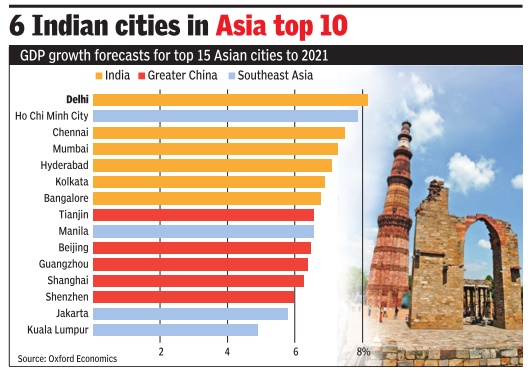
See graphic: The fastest growing cities of India, China and rest of Asia, 2016, (projection) 2021
Delhi will have the fastest growth of any city in Asia, with the economy of the city-state likely to become almost 50% larger in 2021 than it was at the end of last year.
Indian cities are set to expand the most across the Asian region, with growth speeding up from the past five years, according to a new study from Oxford Economics, which has ranked Asia's 30 largest cities.
With financial and business services projected to be the fastest growing sector in India, the capital's dominance in this industry will lead to higher growth and higher incomes.
“Limits on foreign ow nership of Indian companies are gradually being reduced or eliminated,“ wrote Mark Britton, lead economist on the report. “In the short term, this is conducive to strong growth in Delhi's professional services sector, as overseas investors seek advice on possible deals, while in the long term, it should mean steady income streams for such businesses.“
Consumer companies such as Japan's Muji are also betting on such a change. Muji's parent company , Ryohin Keikaku Co, sees India becoming its second largest international market, after China. There is also Amazon.com Inc's Indian unit, which is seeking approval to invest in a food supply chain and take advantage of government moves to ease rules on foreign retailers.
China's expansion is likely to slow, although the largest five cities there will still be recording growth rates of 6% or more. There will be a slight slowdown across the region amid moderating import demand from China, with growth expected to average 4.2% per year over the next five years up to 2021, down from 4.5% in 2012-2016.
Even so, that growth is still much faster than in the developed economies and cities in the region -and that's a big opportunity for companies. Starbucks Corp plans to almost double the number of stores it has in mainland China by 2021, while McDonald's Corp plans to add 2,000 new restaurants over the same period.
Both companies recently announced they were buying out their partners in Mainland China and taking control of operations.
However, there are significant differences across the Asian region. Japanese cities are likely to remain at the bottom of the growth table amid a challenging demographic outlook, with Osaka last in the rankings as its working-age population falls by approximately 1% per year, the report said.
Tianjin is forecast to clock the fastest growth in China, given that it has a large manufacturing base and one of the nation's busiest ports. However, as the services sector expands, the manufacturing and shipping industries may prove to be less supportive in future.
Ho Chi Minh, the largest metro in Vietnam, was the only non-Indian city in the top five, reflecting the city's success in establishing itself as a manufacturing centre, as well as its strong services sector.
Cities with a population of 10 lakh
1901-2011
Statoistics - Indian Cities In 100 Years Million-People Metros Grew From One To 52|Times of India
See graphics:
1. The increase in the number of Indian cities with a population of 10 lakh, or more, 1901-2011- I
2. The increase in the number of Indian cities with a population of 10 lakh, or more, 1901-2011- II
2001-11: the fastest growing cities
‘The fastest growing cities of India, 2001-11’|Times of India
See graphic:
The ten fastest growing cities of India, 2001-11- I
The ten fastest growing cities of India, 2001-11- II
Air services as a developmental indicator
WHAT FLIGHTS TO A MEGACITY TELL US ABOUT ITS ECONOMY, August 17, 2018: The Times of India

ii) The growth of the population of these cities, vis-à-vis the growth of their economies;
From: WHAT FLIGHTS TO A MEGACITY TELL US ABOUT ITS ECONOMY, August 17, 2018: The Times of India
A city is often measured in terms of its GDP, trade, investment. Another way is also to look at the frequency of flights in and out of there. Such a study of flight traffic by The Pudding shows how cities remain unconnected and underdeveloped though growing in number of inhabitants. Population growth without economic growth is ending up creating unsustainable megacities that can neither feed nor house its people. Here’s why a growing city isn’t always good news…
See also
Cities of India: the best and the worst
Cleanliness ranks of Indian cities, districts: 2014-15
Cleanliness ranks of Indian cities, districts: 2016
Cleanliness ranks of Indian cities, districts: 2017
